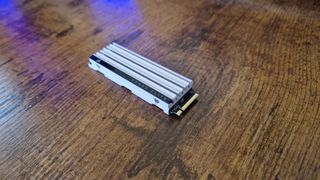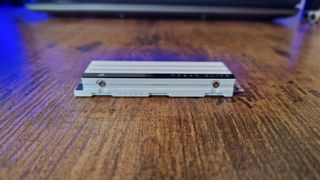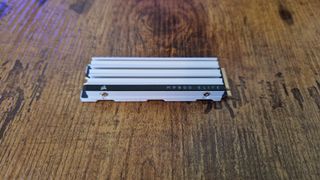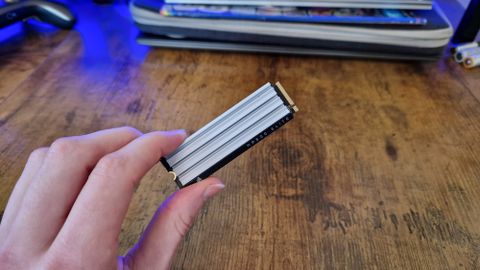GamesRadar+ Verdict
A new rival joins the top PS5 SSD battle royale! The Corsair MP600 Elite gives Samsung, WD Black, and Seagate a run for their money with this top-performing drive. It's pretty good value for a new SSD too.
Pros
- +
Great Gen 4 speeds
- +
Works well in a PS5
- +
Beautiful design and a great heatsink
- +
Competitively priced (at the time of writing)
Cons
- -
Hybrid Gen 5 SSDs may offer more futureproofing
- -
Heatsink is slightly chunky
- -
The MP600 LPX may be more affordable
Why you can trust GamesRadar+
Just as Gen 5 SSDs are starting to steal the limelight, the Corsair MP600 Elite has pulled my focus back to the last-gen race. Gen 5 compatibility is still extremely limited unless you buy an up-to-date motherboard, and in all honesty, those drives are a bit ahead of their time. Fortunately, top-rate Gen 4 performance is still bonkers, and its competitive market thanks to the PS5 is what most buyers should be concerned with.
For a while now, the best SSDs for PS5 have been three contenders that aren't separated by much. The WD Black SN850X, the Seagate FireCuda 530, and the Samsung 990 Pro all push the boundaries of what Gen 4 M.2 drives can achieve, and besides a few discrepancies and fluctuations, they're all similarly priced. There are plenty of budget brands and smaller names in the mix, but Corsair's MP600 range is always pushing to be seen among those top names.
The MP600 Elite is the latest update, and in my eyes, it's boosted the brand into that upper echelon. SSDs have been getting pricier recently, and the biggest names seem happy to let their older products get more expensive. I give props to Corsair for showing some restraint with the price tag here, but mainly for making a decent SSD first and foremost. The MP600 Elite is available in 1TB form for $99 / £99, and 2TB for ~ $150 / £150.
Design & Features

Like pretty much any of the best SSDs for gaming, you'll find the MP600 Elite in a few different shapes and sizes. The one I've tested for this review is designed for PS5 and has a beautiful white heatsink surrounding it. The PC version has a black heatsink, although appears to be the exact same as the white model you'll see in this review's images. If you already have one of the best PS5 heatsinks or you'd like to rely on your motherboard's cooling solutions, it's also available without a heat spreader. You can find it in 1TB, 2TB, and 4TB capacities, and the one I've been testing is a 2TB model. When formatted into Windows 11, our testing rig recognized 1.8TB, which is fairly standard for drives of this size.
I thought it couldn't get much better than the Samsung 990 Pro regarding aesthetics and heatsink design, but I have to hand it to Corsair, this is pretty close. I love the subtle curves and individual vent panels of this heatsink - it's like a suit of armor, with separate plates slotting together to form a secure whole.
Additionally, I love how the bottom of the drive is catered to as well because there are a lot of small spaces for cool air to flow through this heatsink. This is pretty innovative compared to other PS5 SSDs I've tested, and besides making the device slightly chunkier in an M.2 tray, it seems to do the trick.


The MP600 Elite uses the M.2, PCIe Gen 4.0 format, but is backwards compatible with PCIe Gen 3 systems. It's a 2280 drive, so you won't have much trouble fitting this in any standard M.2 slot, either on a PC's motherboard or inside the PS5. Speaking of architecture though, there's nothing too out of the ordinary here. There's a 3D TLC NAND cache Corsair calls "high density", and quoted endurance of 1,200TBW (total bytes written). Luckily, the drive also comes with a 5-year warranty.
Last but not least, we come to the advertised read and write speeds for this drive. Remember, these aren't always exactly what you'll end up with. Depending on your system and the individual drive itself, you'll get minor discrepancies with these numbers. Nonetheless, read/write speeds are quoted as 7,000MB/s and 6,500MB/s.
Performance

As this SSD is designed for PS5 use as well as in the best gaming PCs, I put it to work in Sony's console first. Of course, I'll caveat by saying the numbers recorded inside the PS5 will always be lower than optimal. This is because the PS5's motherboard isn't capable of diverting power to its secondary M.2 bay, which means you'll never get the cream of the storage crop when it comes to numbers.
Nonetheless, the Corsair MP600 Elite fares well against its rivals. The Nextorage NEM-PA SSD managed to reach a PS5 internal benchmark of 6,539MB/s sequential read, which is pretty darn good. In all honesty, that's one of the fastest numbers I've seen the PS5 recognize, and the MP600 Elite comes in just under it with 6,486MB/s. That's even faster than last year's dark horse in the PS5 market, the Verbatim Vi7000G, which scored 6,250MB/s. It's certainly an improvement over the Corsair MP600 Pro LPX, an older model of this drive that the console formatted to 5,581MB/s.

In terms of game data transfers, the MP600 Elite does a great job. My God of War 2018 transfer test (patent pending) was passed with flying colors, as 48GB was flung from the console storage to the drive in just 16 seconds. This was faster than the now discontinued Crucial P5 Plus, which did it in 26 seconds - if anything, that comparison shows you that even if you can't get the maximum speeds of a high-end drive in the PS5, you still benefit from going for a speedier option.
Loading times weren't half bad either but were pretty comparable to other PS5 additional storage options. The table of results below isn't the shining example of testing methodology to quote to your SSD enthusiast friends, but it does give you some idea of how performance figures translate to loading times where the PS5 will allow it. Hunt: Showdown and GTA V are famously slow-loading games, while Outer Wilds loads in a heartbeat.
| Game | Load time |
|---|---|
| Hunt: Showdown's Stillwater Bayou Map | 38 sec |
| GTA Online | 48 sec |
| Outer Wilds | 5.5 seconds |
Like I say, those numbers are pretty par for the course for SSDs I've tested in the PS5, and definitely not the slowest numbers I've seen (he says, giving side-eye to the WD Black SN850P).
Of course, to test performance more thoroughly, we need to turn to our testing PC and CrystalDiskMark. I'm pleased to say those advertised speeds, which Corsair notes as maximums, were exceeded with the model I tested. The quoted 7,000MB/s was surpassed by an average of 7,038MB/s across three tests. The quoted read speed of 6,500MB/s was trounced by an average of 6,587MB/s.
For a comparative note in my Crucial T700 Pro review, I went back to get more up-to-date performance figures of the Seagate FireCuda 530 and found sequential read/write speeds of 7,034MB/s / 6,739MB/s respectively. The MP600 Elite managed to scrape past the read speeds of the FireCuda 530 by the skin of its teeth and just fell short of its write speeds. It's up there, though, and I consider the FireCuda 530 to be one of the pound-for-pound greats. Taking into account that Seagate's option goes in and out of stock in a heartbeat, and its price is woefully inconsistent due to its popularity, I think Corsair's got a real contender on its hands here.
Should you buy the Corsair MP600 Elite?

SSDs are more expensive year-on-year, and with the FireCuda, SN850X, and 990 Pro all proving more difficult to get a hold of, Corsair has launched a new option worth getting instead. Its pricing at 1TB and 2TB are very competitive for a new drive, and although its numbers don't shoot for unattainable new highs in the Gen 4 market, it stands toe-to-toe with the best options.
In truth, the biggest caveats I'd offer anyone looking to buy this is that its older sibling, the MP600 Pro LPX, is still readily available, and quotes speeds that are actually better (although by all accounts it falls short of those numbers). It's also available in 8TB and 500GB shapes, which the Elite model has forgone. Similarly, anyone looking for more futureproofing could look to more recent hybrid Gen 5 SSDs that are backwards compatible with Gen 4 systems.
In any case, the MP600 Elite is a new top contender I can recommend easily. I love its heatsink, its performance, and its price tag.
How we tested the Corsair MP600 Elite
I tested the Corsair MP600 Elite inside my PS5 and our hardware team's testing PC. I used CrystalDiskMark to test sequential read and write numbers, as well as the PS5's own internal benchmark. I used the SSD inside the PS5 to play games, transfer files, and record loading times.
To read more about the ways we test the latest gaming gear, check out our hardware policy.
Looking for external storage boosts instead? Check out the best external hard drives for gaming, the best PS5 external hard drives, and the best Xbox Series X hard drive.

Ever since playing Journey at the age of 15, I’ve been desperate to cover video games for a living. After graduating from Edinburgh Napier University with a degree in Journalism, I contributed to the Scottish Games Network and completed an Editorial Internship over at Expert Reviews. Besides that, I’ve been managing my own YouTube channel and Podcast for the last 7 years. It’s been a long road, but all that experience somehow landed me a dream job covering gaming hardware. I’m a self-confessing PlayStation fanboy, but my experience covering the larger business and developer side of the whole industry has given me a strong knowledge of all platforms. When I’m not testing out every peripheral I can get my hands on, I’m probably either playing tennis or dissecting game design for an upcoming video essay. Now, I better stop myself here before I get talking about my favourite games like HUNT: Showdown, Dishonored, and Towerfall Ascension. Location: UK Remote

Legend of Zelda: Tears of the Kingdom builder masterfully recreates the tank from 1996's Metal Slug to devastate Hyrule

Escape From Tarkov dev apologizes for paywalling PvE behind a $250 edition - will now open access to the mode in waves "for free"

Manor Lords archers are a little "ineffective" now because they were totally overpowered before: "This will surely take a while to get right"
